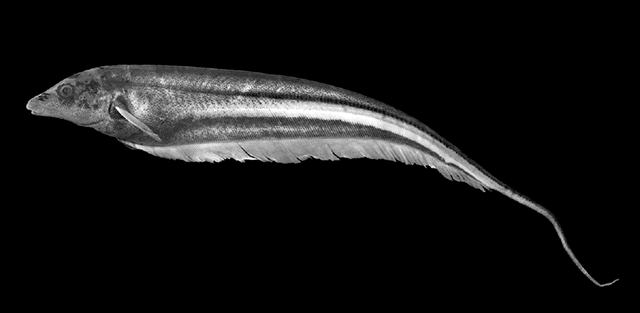| Sternopygidae (Glass knifefishes) |
| 34.2 cm TL (male/unsexed) |
|
benthopelagic; freshwater |
| South America: Rio Mucajaí and Rio Uraricoera in the north-eastern portions of the Amazon basin, Brazil. |
|
Anal soft rays: 190-222. Distinguished from other congeners by having the following combinations of characters: length of the gape with the rictus falling short of the vertical through the posterior naris; the length of the coronomeckelian bone 50% or more the length of Meckel’s cartilage; the length of the posterior ceratohyal approximately the same length as the ventral hypohyal; 10-14 scales above the lateral line at the midbody; the form of the premaxilla with the anteroposterior length greater than the transverse width; the distribution of the teeth on the dentary restricted to anterior one-half or slightly more of the dorsal margin; five or six teeth arranged in single row on the internal surface of the endopterygoid; presence of a narrow dark stripe along the lateral line and a broad band of dusky to dark pigmentation overlying the basal pterygiophores of the anal fin; 18-21 pectoral-fin rays; 190-222 anal-fin rays (Ref. 93148). |
| The type locality, Rio Mucajaí, is characterized by rapid flowing water and a 20 m high waterfall. The species was encountered above these falls in an area with many rapids and no still backwaters (Ref. 93148). |
|
Least Concern (LC); Date assessed: 07 November 2018 Ref. (130435)
|
| harmless |
Source and more info: www.fishbase.org. For personal, classroom, and other internal use only. Not for publication.
